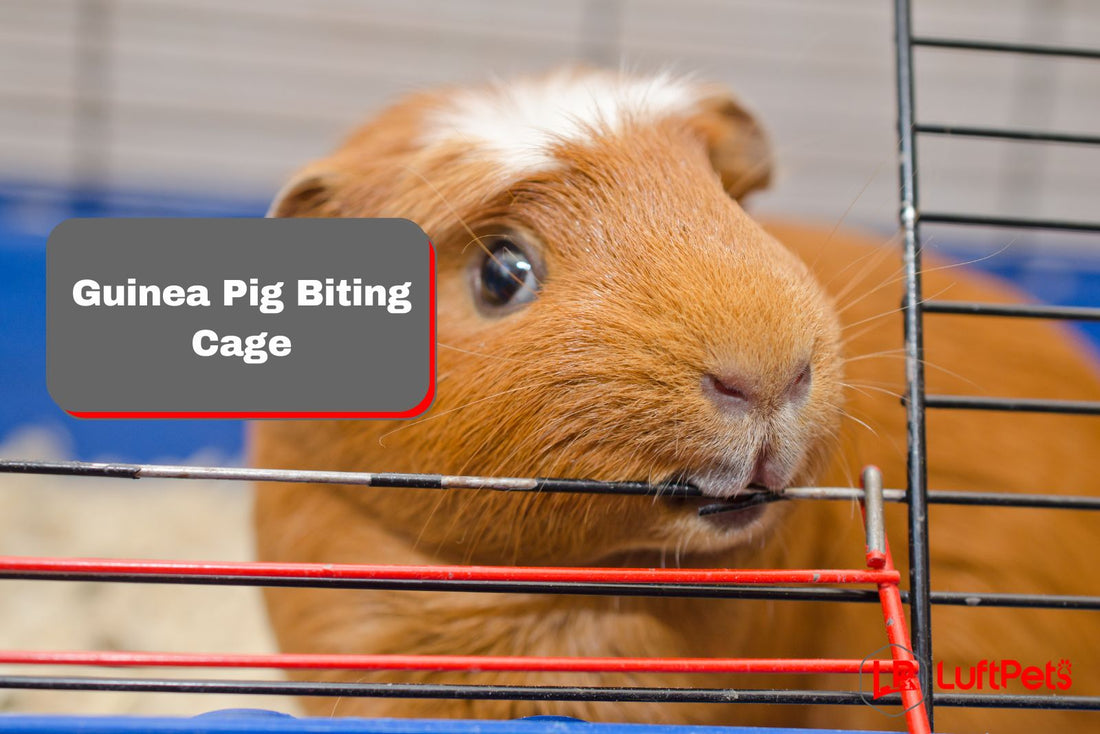"Guinea pig biting cage" – is this a phrase you find yourself Googling often? You're not alone.
Studies reveal that this typical behavior, often from boredom, hunger, or dental problems, leaves many guinea pig parents puzzled [3].
But don't worry! As a seasoned veterinarian and guinea pig parent, I will demystify this issue for you.
Keep reading to learn about guinea pig cage biting (in 6 underlying causes) and how to solve it FINALLY!
Key Takeaways
- Understanding the underlying causes behind guineas biting their cage.
- Learning about behavioral management techniques and safe chew toys for guinea pigs.
- Insights into dietary adjustments that can curb cage-biting behavior.
Guinea Pig Biting Cage: 6 Underlying Causes and Solutions
Persistent cage biting by your guinea pig signals a potential issue, such as hunger, boredom, loneliness, or discomfort. To address this, you must opt for proper feeding, mental stimulation, companionship, or medical attention.
Let's explore these six reasons (and possible solutions) in more detail below...
#1 Hunger-Induced Cage Biting
As a vet and guinea parent, here's some "obvious" news: Guinea pigs are incessant eaters.

In fact, their metabolism requires them to eat frequently, so they can get pretty impatient when they're hungry.
If your furry friend starts biting the cage bars around feeding time or when you're in the room, it may well be telling you, "I'm hungry, feed me now!"
But remember, giving in immediately to their demand could inadvertently reinforce this behavior.
To tackle this, establish a regular feeding schedule, ensuring your guinea has a constant supply of hay.
Besides, Timothy hay or orchard grass hay should form the bulk of their diet, with some fresh veggies and a controlled amount of guinea pellets for nutritional balance.
Consistency is key. Stick to this routine; over time, your furry friend will get used to the schedule, significantly reducing hunger-induced cage biting.
Discover the ultimate comfort and cleanliness for your furry friends with our Premium Guinea Pig Cage Liners – a must-have addition to elevate your guinea pigs' habitat!
#2 Cage Biting as a Form of Communication
Like the rest of the animal kingdom, guineas are expressive, social animals, so biting their cages can mean: "Hey, I'm here."

To elaborate, if you notice your guinea bites their cage whenever you enter the room or at specific times of the day, they may seek your attention.
In these situations, don't reward the biting behavior with treats or extra attention. Instead, take some time to interact with them at regular intervals throughout the day.
Ensuring your guinea has ample floor time and social interaction can help curb this attention-seeking cage biting.
#3 Boredom-Related Cage Biting
A bored guinea will likely resort to behaviors like cage biting to keep themselves busy. Ensure your guinea pig's living space is adequately stimulating.
Their cage should be spacious (a minimum of 8 square feet for a single guinea pig), have multiple hiding spaces, and be equipped with various chew toys to keep them entertained.
Besides, introducing activities outside their cage, like supervised floor time or time in a safe outdoor enclosure, can help to keep them stimulated and reduce the incidence of cage biting.
#4 Pain or Illness-Induced Cage Biting
This one is critical. Sometimes, a guinea pig may resort to cage biting due to discomfort, pain, or underlying health issues.
This one is critical. Sometimes, a guinea pig may resort to cage biting due to discomfort, pain, or underlying health issues.
This can also be linked to other unusual behaviors such as urinating on their owners. If you have experienced this, understanding "why do guinea pigs pee on you" might provide insights into their behavior.
If the cage biting is persistent, accompanied by other symptoms like changes in eating or elimination patterns, lethargy, or sudden changes in behavior, it's time to consult a vet.
As a veterinarian, I cannot stress enough the importance of professional medical advice in such situations.
By understanding these root causes, you, as a guinea parent, can effectively address the issue of your guinea pig biting their cage.
Remember, patience and consistency are key, and soon, with the proper measures, you'll observe a decrease in this behavior.
Always ensure your guinea's comfort and well-being are prioritized to ensure they live a happy, healthy life.
#5 Inadequate Space
Lastly, inadequate cage space may be an underlying cause for your guinea pig's cage-biting habit. Guinea pigs are active animals that need ample space to roam and explore.
Additionally, considering the right pads for guinea pig cages can enhance their comfort and the hygiene of their environment, making the space more conducive for their activities.

If their cage is too cramped, they may bite the cage bars out of frustration or an attempt to escape their confined living conditions.
As referenced in a PETA study, confined conditions can cause distress and inhibit natural behaviors, leading to aggressive behaviors such as cage biting (2).
For a single guinea, a minimum of 7 to 10 square feet of cage space is recommended.
If you're housing multiple guineas, you'll need even more space to prevent territorial disputes and ensure each guinea has enough room to move around comfortably.
Invest in a spacious cage and provide plenty of floor time outside the cage in a safe, supervised environment.
With multiple guinea pigs, even more, space is needed to avoid territorial disputes and ensure ample room for movement.
#6 Dental Health and Teething
Guinea pigs' teeth never stop growing, which requires constant wear down through gnawing. If left unchecked, this may lead to discomfort, even pain, and provoke cage biting as a coping mechanism.
Also, young guineas, like human toddlers, experience teething, which can also lead to increased cage biting.
A study by Jörg Mayer suggests that changes in behavioral parameters may indicate pain in small mammals, such as excessive chewing or cage biting (1).
To mitigate these issues, provide chew toys and ample hay to promote regular gnawing and maintain dental health.
Before I move on, I'll provide a brief comparison table (for a short review):
| Underlying Cause | Solution |
|---|---|
| 1. Hunger-Induced | Maintain a consistent feeding schedule, and ensure a constant supply of hay. |
| 2. Communication | Regularly interact with your guinea pig, and offer floor time and social engagement. |
| 3. Boredom-Related | Ensure a stimulating environment, provide toys, and supervise outdoor time. |
| 4. Pain or Illness-Induced | Consult a vet if symptoms of illness or discomfort are observed. |
| 5. Inadequate Space | Provide a spacious cage (minimum of 7-10 square feet for one guinea pig). |
| 6. Dental Health & Teething | Offer chew toys and ample hay for gnawing to maintain dental health. |
Now that you watched a glimpse, let's delve into this video for a quick recap (then head over to the frequently asked questions)!
FAQs
1. Why does my guinea pig bite his cage at night?
Guinea pigs are crepuscular, which means they are most active during dawn and dusk. Your guinea pig might be hungry, bored, or seeking attention.
2. How can I stop my guinea pig from biting his cage?
Enrich your guinea pig's environment, establish a feeding routine, provide safe chew toys, and ensure social interaction to curb cage biting.
3. Are there any risks if my guinea pig bites his cage too often?
Frequent cage biting can lead to dental problems or injuries.
Always consult a vet if your guinea pig's cage biting is persistent or accompanied by other unusual behavior.
Conclusion
Understanding the "guinea pig biting cage" puzzle is a blend of deciphering guinea pig behavior and catering to their needs.
You can successfully curb this behavior as you enrich their environment, maintain their diet, and ensure they are socially engaged.
Take note that each guinea pig is unique, and patience is vital to managing their habits and ensuring their well-being.
Before you leave, comment and tell me how much you enjoyed my article.
Until next time!
Resources
1. Mayer J. Use of behavior analysis to recognize pain in small mammals. Lab Animal. 2007;36:43–8.
2. Peta foundation [Internet]. PETA. Available from: https://www.peta.org/wp-content/uploads/2022/01/2022-01-25-usda-request-investigate-shelby-alternative-livestock-auction.pdf
3. Winkler DE, Clauss M, Rölle M, Schulz-Kornas E, Codron D, Kaiser TM, et al. Dental microwear texture gradients in guinea pigs reveal that material properties of the diet affect chewing behaviour. The Journal of Experimental Biology [Internet]. 2021 [cited 2023 Jul 13];224:jeb242446. Available from: https://pubmed.ncbi.nlm.nih.gov/34124765/

